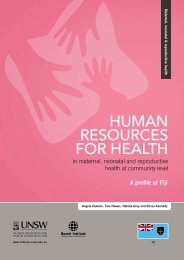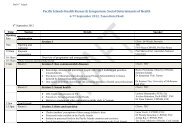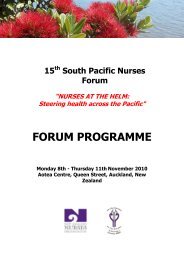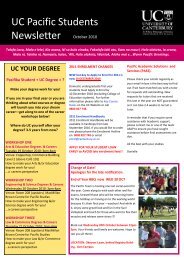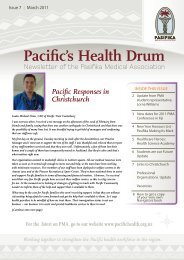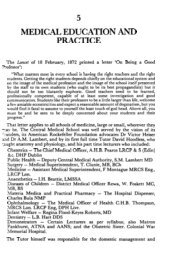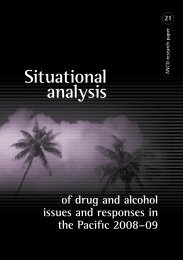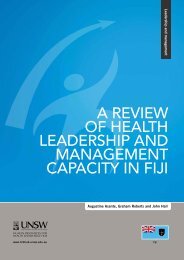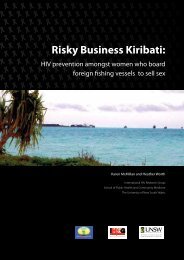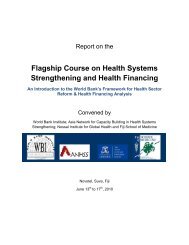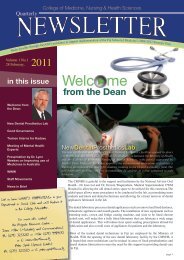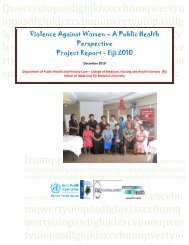rp21 situational analysis - Pacific Health Voices
rp21 situational analysis - Pacific Health Voices
rp21 situational analysis - Pacific Health Voices
Create successful ePaper yourself
Turn your PDF publications into a flip-book with our unique Google optimized e-Paper software.
Situational <strong>analysis</strong> of drug and alcohol issues and responses in the <strong>Pacific</strong><br />
92<br />
<strong>Health</strong><br />
As the main drug of concern, alcohol<br />
is included in the Nauru National Non-<br />
Communicable Diseases Action Plan<br />
2007–2012. The plan is consistent with<br />
the objectives of WHO and the SPC, developed<br />
and supported in line with the <strong>Pacific</strong><br />
Framework for the Prevention and Control of<br />
Noncommunicable Diseases and the 2008–<br />
2013 Action Plan for the Global Strategy<br />
for the Prevention and Control of Noncommunicable<br />
Diseases. The plan includes<br />
the development of core and and optimal<br />
strategies for alcohol control. The legislative<br />
strategies listed above are core areas<br />
of work. The optimal strategies include the<br />
development of a national leadership model,<br />
a data collection and <strong>analysis</strong> system, and<br />
coordination of civil society organisations.<br />
Interventions also include the ongoing development<br />
of a school-based curriculum. 430<br />
Regulation<br />
The negative impact of trade agreements<br />
on the capacity of nations to regulate alcohol<br />
and tobacco imports is well documented<br />
by WHO. In the context of harmful rates<br />
of alcohol consumption, the Government<br />
of Nauru has committed to voting against<br />
trade liberalisation of alcohol under PICTA,<br />
to be renegotiated in 2009.<br />
Non-government organisations<br />
Nauru is a member of the <strong>Pacific</strong> Islands Association<br />
of NGOs, with the peak representative<br />
body being the Nauru Island Association<br />
of NGOs. Notably, the PDARN delegate reports<br />
there are currently no NGOs operating<br />
in Nauru.<br />
7.6 Australian involvement<br />
Australia has a longstanding relationship<br />
with Nauru as one of the three countries 431<br />
assigned a joint trustee mandate over the<br />
island at the end of World War I. When Japanese<br />
occupation during World War II ended,<br />
Nauru became an Australian trust territory<br />
until it achieved independence. 432 Since the<br />
collapse of the phosphate mining sector,<br />
Australia has maintained an ongoing development<br />
assistance program in Nauru.<br />
Australian Agency for<br />
International Development<br />
Total overseas development assistance<br />
to Nauru for 2008–09 is estimated to be<br />
AU$26.6 million. Of this, AU$15.23 million is<br />
allocated to the country program. Program priorities<br />
include economic reform and management,<br />
improving service delivery and capacity<br />
building. In addition, Australia contributes to<br />
the Nauru Settlement Treaty and discretionary<br />
funding negotiated annually under the<br />
Memorandum of Understanding. 433 As part of<br />
430 Ibid.<br />
431 Britain and New Zealand were the other two countries.<br />
432 Above, fn.418.<br />
433 AusAID, Aid program in Nauru, available at: (accessed April 2009); Australia and Nauru have agreed to<br />
their 5th Memorandum of Understanding for the 2008–09 period.



